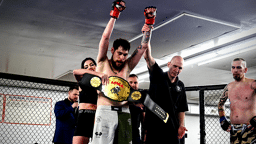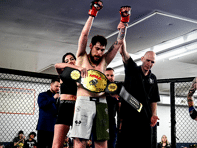Also read: Dawn Ennis’ story at the Daily Beast talking with both Rosi Sexton and Fallon Fox
When people ask me why trans rights are something I care about, I tell them the truth: I want to support my trans friends who are too often on the receiving end of some awful discrimination, abuse and harassment.
Nobody should have to argue for the right to be who they are.
Understanding this has been a journey for me. It’s time for me to talk about some of that.
I was once an MMA fighter, and one name that keeps getting brought up with me is that of Fallon Fox.
Fallon was the first prominent trans woman to compete in MMA. She still is.
Rumors and falsehoods have been spread about her not just in the MMA world, but way beyond. People who have never had any interest in MMA, but are looking for any excuse to demonize trans people, have fixated on her particular case.
Back in 2013 when she first hit the headlines in the MMA world, I made some public comments about the situation. This was the first time I’d really thought about trans women competing in sport, and my initial reaction was similar to that of many people I speak to.
I wondered if it was fair, if it was safe. I didn’t have anything against trans women, and I believe in inclusion, but I was concerned about the possible risk to those of us who were “born and raised as women.”
I suggested that a fighter should have the right to know if her opponent was transgender, so she could make her own assessment of the risk.
I believed at the time that the comments I made were respectful and well intentioned. I certainly didn’t mean to cause any harm.
I was wrong.
Sometimes we cause harm without intention, through ignorance. When we do, our good intentions matter less for those they affect than the negative outcome.
I bumped into Fallon a few months ago on a Facebook forum, and she reminded me of what I’d said in 2013. Quite rightly she called me out on it, and she asked me whether I’d changed my mind.
It was an uncomfortable exchange.
To tell the truth, I’ve learned a lot in the last eight years. I’m now embarrassed by some of what I said back then.
I hope that I can challenge some of those misconceptions and stereotypes today. Perhaps by talking about how I came to change my mind, I might leave the door open for others to follow.
Trans women in sport
The two most common objections directed towards trans women competing in sport alongside cis women are that “it’s not fair” and that “it’s not safe.”
Similar arguments were once made justifying racial segregation in sport. The perception that Black athletes have an “unfair” advantage over their White counterparts led to racial discrimination and harassment that closely mirrors that targeting trans women today.
Let’s tackle the most common, and most pernicious, falsehood: Trans women competing in sport are men who self-identify as women in order to gain an unfair advantage.
In order to compete in most competitive sports, trans women have to satisfy strict criteria to prove that they have undergone hormone treatment. They have suppressed testosterone levels for a certain period of time (often a minimum 12 months).
On top of that is the description of a trans woman who has undergone hormone treatments as “biologically male.” Although biological sex has a number of different elements to it, hormones play a significant role, especially when it comes to performance.
The idea that someone who isn’t trans would do this just for an athletic advantage is absurd. In the history of trans people in sport, since Renee Richards competed in the Women’s US Open Tennis Championships in the late 1970s, that has literally never happened.
Advantages
Perhaps trans women are still left with an advantage, though, even after hormone treatment.
No reasonable person is seriously arguing that trans women are biologically identical to cis women, or trans men to cis men.
We are all different.
Any categorisation in sport — for example by sex, weight, age, or experience — is an imperfect attempt to control for some of these differences so that more people can meaningfully participate.
Biological advantages come in lots of forms. There are the obvious ones, but also many more that are less obvious (such as genes regulating lactic acid metabolism). It would be impractical to have separate categories for every single one of them.
Advantages and disadvantages can also balance each other out.
Some athletes naturally have a higher proportion of fast-twitch muscle fibres, which give them an advantage in speed and power. Those fibres also fatigue faster.
Within a weight class, a fighter who has to “cut” more weight may have a strength advantage, but they are likely to pay a cost in endurance.
It may be the case that some trans women have slight advantages in certain attributes compared to cis women, but they are likely to have disadvantages in others.
On average, trans women have a larger frame, but hormone treatment has a dramatic effect on strength, resulting in less muscle to power that frame.
There’s a perfectly valid scientific discussion to be had about appropriate eligibility criteria, and where the line should be drawn to allow trans athletes to compete alongside their cis counterparts. In fact, the criteria used by the IOC have changed over time (notably the requirement of gender-reassignment surgery was removed in 2015).
It’s likely that the IOC’s current criteria will be adjusted and improved over the coming years as science learns more. We may find that slightly different criteria will be needed in different sports, depending on the differing physical demands.
It could even turn out that, as trans athlete Kirsti Miller convincingly argues, the current rules are too stringent and force trans women to compete in an unhealthy state that not only puts them at a disadvantage compared to cis women, but forces them to sacrifice their health in order to compete.
The reality is that weighing advantages and disadvantages in sport is necessarily more complicated than simply measuring muscle mass or even raw strength in a laboratory.
“Fairness”
After all this, what, exactly, do we mean when we talk about “fairness”?
There’s a danger that we end up saying trans people can compete as long as they never win. Because as soon as they do, it “proves” that they had an advantage all along.
Looking across a range of sports, we find that trans people are winning no more often than we’d expect given the number who compete. Surely that is the only meaningful measure of fairness we can ask for?
The International Olympic Committee has had a trans-inclusive policy since 2003. In that time, there have been no publicly out trans Olympic athletes (though that will likely change in 2021).
The idea that trans women would make women’s sport meaningless by easily dominating the competition has not, so far, materialized at any level.
If trans women do have an unfair advantage over cis women, then it’s a hard one to spot.
Physical safety
In contact and combat sports, another concern is often raised.
What if trans women do have a physical advantage, to the extent that it increases the risk of injury to cis women competing against them?
As with the question of fairness, this needs a bit of unpacking.
No contact sport is risk-free. In fact, injuries happen routinely during competition.
While many outsiders would find the sensational headline that “Fox fractured a woman’s skull” disturbing, those of us who are more familiar with the sport understand that an orbital fracture (the actual injury) is a not-uncommon injury. There are numerous other examples of that same injury in both men’s and women’s divisions.
Does a trans woman inherently pose a higher risk to her opponents than other elite female fighters?
Historically, the answer is clearly “no.”
There’s a long list of cis female fighters who have caused more — and more serious — injuries in combat sports than any trans woman. I’m not proud that I may be on that list.
Still, do trans women fall outside the range of physical attributes that we might otherwise expect to come up against in competition?
That’s certainly not been the case with any combat sports athlete we’ve seen so far.
Admittedly, the sample size is low. Perhaps, as some suggest, we should wait until we have more evidence before we allow trans people to compete in sports?
I’ve come to believe that the answer to that is also “no.”
We should continue to promote inclusive policies that are transparent, based on the best evidence available, and allow athletes to keep important medical information confidential from both competitors and the public.
There are always uncertainties in anything as complex as human performance, and it makes sense to try to make our metaphorical playing field as level as practicable, with studies and science.
But we cannot and should not exclude trans people from sport until we have perfect knowledge. We take far bigger risks every time we step in the octagon.
The bigger picture
When I first looked at this question, I looked at evidence and the sports science, limited though that was in 2013. What I missed was listening to the voices of trans people.
Back then, I didn’t know anyone who was openly trans, and I knew nothing of their experiences.
I’ve been fortunate to get to know some amazing friends who have helped me appreciate a bit better what they go through. Although I know that there will always be elements to that experience that I just don’t understand, I can empathise a little more.
The biggest thing that I’ve learned, and the thing that came as a huge shock, was the sheer amount of abuse and harassment that trans people face every single day of their lives, just for being who they are.
I get it, now.
Whenever I stand up for trans-inclusive policies, I get a barrage of similar abuse hurled my way, allegations that I support abuse of women, of children, that I’m stupid and don’t understand biology, that I’m on the side of deluded or predatory men.
It can become overwhelming.
Yet this is a tiny fraction of what my trans friends experience. I could opt out and walk away. They can’t.
Sport is empowering. Back in the early 2000s, there were plenty of those in the MMA world who didn’t believe that women had a place in the sport. We fought to be there, and we fought hard for the right to compete on the same shows, with the same rules, as the men. We won those battles.
As a woman, I have benefitted enormously from my time in MMA. It’s given me confidence, physical abilities, enjoyment, a positive relationship with my body, and a supportive community that I’m a part of.
How could I now argue for rules that would needlessly deny that experience and those benefits to people from other marginalized groups?
When I’ve spoken to trans people, I’ve found them very willing to talk about the issues they’re facing, and to patiently explain and educate me when I’ve gotten things wrong.
The issue of trans women in sports seems to have attracted all manner of people who had no previous interest in women’s sports.
“I’m not transphobic, I’m just passionate about the rights of female athletes.” That has become the new “I’m not racist, but…”.
Where were they when women were fighting our own battles for inclusion?
At the beginning of my career, women’s mixed martial arts didn’t exist in the United Kingdom. I finished my career as the first British woman to fight in the UFC.
Nowadays MMA is one of the few sports in the world where women compete on the same platform, and under the same rules, as the men. We made that happen.
Some of the people who are arguing now against trans participation in mainstream sport are the very same people who a decade or two ago were telling us that they didn’t want to see women fighting, or posting misogynistic comments about female fighters, or talking about what a joke female MMA was.
The people so concerned about the “safety” and “rights” of female fighters are nowhere to be seen when we talk about other issues we face. These people are not our allies.
Humans come in all manner of shapes, sizes, body types, with different strengths and weaknesses.
Sport has a proud tradition of bringing people together across borders, and in spite of our divisions. Sport at all levels, especially grassroots and recreational sport, has much to offer for the health of both individuals and communities.
Trans people are sadly one of today’s most marginalized groups, and they deserve the opportunity to share those benefits, as much as any of us.
You can follow Rosi Sexton on Twitter.







































